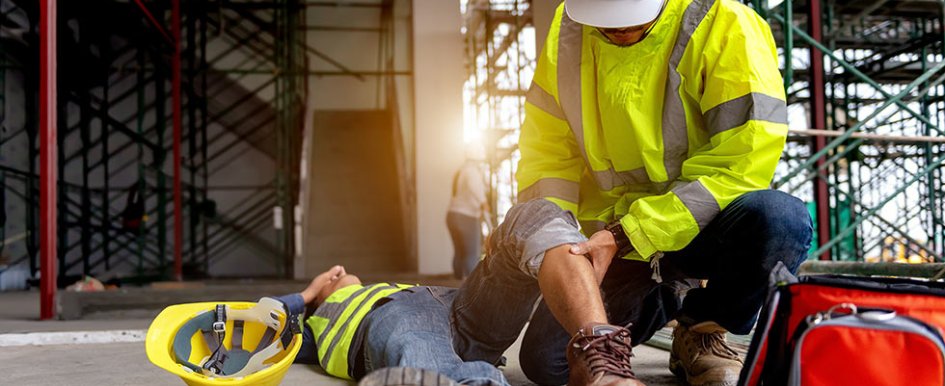
As the year unfolds, economic uncertainty and labor shortages continue to take a toll. In addition to filling open positions, construction business owners grapple with another dilemma — injured employees missing work. The construction industry is notably high-risk; according to the Bureau of Labor Statistics, construction has the second-highest occupational fatality rate. The Travelers 2022 Injury Impact Report found that injured construction workers spend an average of 98 days away from work. The monthslong loss of work is an incredible burden to an already diminished workforce.
In addition, Travelers reported that 40% of injured employees also experience psychological symptoms that can impede the recovery process. If left unaddressed, these mental health concerns may increase an employee’s time away from work. So how can you help your workers make a full recovery? To learn more about the recovery process, Construction Business Owner (CBO) Magazine spoke to Dr. Marcos Iglesias (MI), the chief medical director at Travelers insurance. Iglesias has more than 30 years of experience in the areas of workers’ compensation and disability treatment, evaluation and insurance leadership. He has developed solutions for disability management, including early interventions for workers to reach preinjury function. Read on for an in-depth look at holistic recovery and ways this approach can benefit your workforce.
Construction is a high-risk industry. How do injuries impact a workforce?
Anytime an employee is injured at work, there are many effects on the workforce. The injured employee now needs to focus on getting the appropriate medical care and attention so they can work on their recovery while also navigating the workers’ compensation claim process. While every instance is unique, some may encounter challenges during their recovery, such as feelings of frustration or disconnection, especially if they’re out of work for a long period.
Other employees may also be affected by the injury. For instance, they may be worried about their injured colleague and concerned about their own safety and well-being while at work. Their workload could increase as there is one less person on-site. Stress can lead to poor performance and poor health.
The employer is now helping the injured employee get the necessary care and attention while also making sure they’re maintaining operations. Depending on the severity of the injury, the employer may need to figure out how to manage the same amount of work with a smaller workforce or hire additional workers.
What is holistic recovery and why does it matter?
At Travelers, our claim professionals are there to work with the injured employee, and they take a holistic approach. This means they’re putting the injured employee at the center of everything they do and assessing the medical as well as the psychological and social factors that may affect how the employee recovers from their injury or illness. These factors are often unrelated to the specific injury but to the individual’s mindset, such as catastrophic thinking or lack of positive coping strategies. Identifying these factors early on helps ensure that injured employees are getting the support they need from the very beginning of the claim while also allowing our nurses to intervene when necessary.
How might a physical injury affect a worker’s mental health?
Being away from work because of an injury can lead to an individual experiencing negative health consequences, such as getting discouraged or not feeling productive or engaged in the community. This period of worklessness is a health and wellness issue, so employers have a role to play: maintaining contact with the injured employee; checking in with them; and encouraging a modified duty program as they recover. Even in construction, where much of the work requires physical labor, there are tasks that can be assigned that could help employees return to work with limitations.
Why is it important to address an injured worker’s mental health as well as their physical health?
As I mentioned, it is important because mental and physical health are connected, and cognitive and emotional factors unrelated to an individual’s injury can negatively affect the recovery process.
What are the potential consequences of returning to work before a full recovery?
One significant risk of going back to work too soon is the potential for reinjury. The decision on when to return to work needs to be made with input from the injured employee’s doctor and medical care professionals with insights on unique job demands to help avoid negative consequences.
How can construction business owners help facilitate a full recovery for their workers? Are there any services injured employees can use to help the holistic recovery process?
When an employee is injured, it’s important to respond immediately in a nonjudgmental manner and use an occupational medicine facility that is familiar with construction-related injuries. Then, it can be helpful to maintain contact throughout their recovery and identify transitional duties that can help the injured employee feel valued and productive as they work toward returning to full duty as soon as medically possible.
There may also be tools available through the construction business owner’s workers’ compensation insurance provider that injured employees can use. For instance, Travelers offers a resilience-building app, called Wysa for Return to Work, to injured employees who indicate one or more psychosocial barriers to their recovery during conversations with a Travelers nurse or claims professional. The app helps users build mental resilience skills that can assist in overcoming psychosocial barriers to function.
Have you noticed industry attitudes changing toward holistic recovery?
Yes, there is an openness to talking about the whole person. This is a positive development that can help individuals get back on their feet after a work-related injury.
What else should contractors know about holistic recovery?
Holistic recovery makes sense; it understands that medical conditions are “attached” to a real human being who is complex. By looking at the individual as a whole, we can empower them as they seek to recover and return to function.
